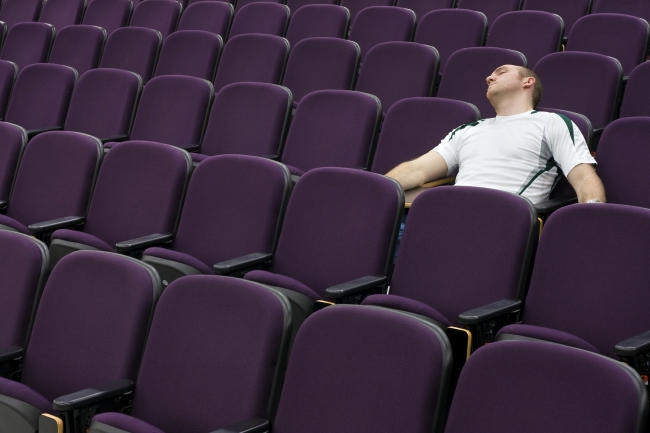You have /5 articles left.
Sign up for a free account or log in.

iStock
For many, 8 a.m. classes are a slog. At Lake Superior State University in Sault Ste. Marie, Mich., they can be a slog in 10-degree weather. For now.
Next fall, students there will wake to find 8 a.m. classes replaced by a free “common hour” intended to increase participation in recently instituted shared governance initiatives at the university.
Ridding the university of early-morning classes that are despised by many (though not all) students and professors is actually a side effect, officials said, of an attempt to find a time during the day when more people would be able to attend University Senate and various issue-specific committee meetings.
“We see this as a beneficial side effect,” said the university’s provost, David Finley. “Many college students aren’t at their best at that hour.”
These meetings are part of a broad push that started in 2009 to gather input from students and university employees and increase participation in the university’s decision-making process. And because Lake Superior State University is on the small side -- only about 2,000 students and 400 employees -- officials saw an opportunity to include a significant number of people.
These types of meetings were originally scheduled for 5 p.m., but that conflicted with dinnertime for students and was hard for many faculty and staff, especially those with children. After dismissing the possibility of 4 p.m., which conflicted with lots of labs, and noon, which nobody wanted to give up, university officials settled on eight.
“We’re optimistic that this will allow those go-getter students and staff not on the clock after five to be included in shared governance,” he said. Although, he added, “I’d be naïve to say I didn’t think there’d be more sleep.”
Students seem to like the idea, too.
“I haven't heard a single negative response from any of our current students,” Richard Homan, president of the Student Government there, said in an email. “I'm sure that some students will take this opportunity to sleep in, but I also believe that many students will take this as a chance to prepare for classes, complete homework and attend university committee meetings. I know that I will be attending these meetings.”
Research into the effect of course scheduling on student performance is scant and contradictory, however.
A 2008 analysis of 12,886 Clemson University students, for example, found that their grades increased in courses they took as the day wore on, and were particularly bad early in the morning. But those effects were rather small and the study’s authors note that they did not look at professors, who may vary in quality or assign different grades based on the time of day.
Still, the analysis showed that each hour later in the day that a class started was associated with a 0.024 grade point increase (on a normal grading scale where 4 equals an A, 3 a B and so on). Angela Dills, now an associate professor of economics at Providence College, and Rey Hernandez-Julian, associate professor of economics at Metropolitan State University of Denver, authored the paper, which can be found here.
A smaller but more recent study, however, from St. Lawrence University in New York, found essentially the opposite result. For every one hour that classes started later, the grade point average of 255 St. Lawrence students declined by 0.022 points. The study, authored by associate professors of psychology Serge Onyper and Pamela Thacher, looked at a number of factors, however, including alcohol use, sleep duration and student sleepiness.
Because Onyper and Thacher found that sleepiness does affect student academic performance negatively, they suggest another factor -- alcohol use -- might be to blame for the poor-performing afternoon-class takers. Students in later classes were more likely to binge drink the night before class and therefore get less restful sleep.
Speaking generally, Michael Reilly, executive director of the American Association of Collegiate Registrars and Admissions Officers, said, “I'm not sure giving up 8 a.m. classes is in the best interest of most institutions.” He noted the conflicting studies on the issue; there being “those who find it attracts organized, serious students and those who say it attracts the registration procrastinators.”
And, Reilly said, in the latter case, the best solution might involve online versions of those early courses. “I'll also add,” he said, “that most campuses would find it difficult to make up the lost classroom capacity from ending 8 a.m. classes.”
So far, at Lake Superior State, classroom logistics don’t seem to be causing too much trouble. To accommodate the free hour in the morning, Finley said, officials there pushed all the morning classes back an hour -- 8 a.m. classes to 9 a.m., and so on. They left the afternoon classes as they are and moved the noon block of classes to the evening. Essentially, Finley explained, the university’s class day would operate on a nine-to-six schedule rather than eight to five while still maintain the same number of time slots. Plus, a new building is opening soon, which will add 10 more classrooms.
“What remains to be seen is whether students will get up to go to a meeting,” said Thomas Pink, director of public relations as Lake Superior State. “It’ll be interesting to see how this goes.”




